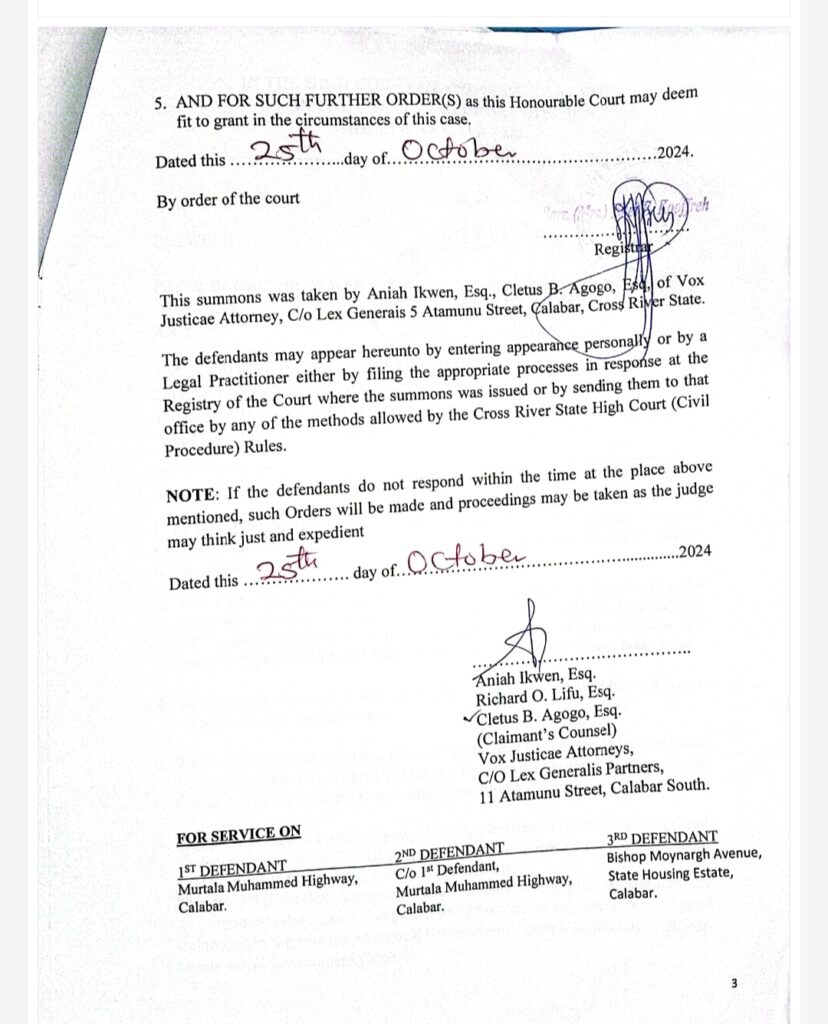
Calabar, Cross River State – In a significant legal development, two chairmanship aspirants of the All Progressives Congress (APC) from Obudu and Bekwarra Local Government Areas, Peter Banbeshie Ikwen and Chris Obogawon Ogaidan, have filed a suit in the High Court of Cross River State, Calabar Judicial Division. This legal action, initiated on October 25, 2024, brings into question the legitimacy of the APC’s local government primary nominations for the upcoming 2024 elections.

The suits which are commenced under Originating Summons are:- Peter Banbeshie Ikwen v. APC & 2 others HC/247/2024 and CHRIS … OGAIDANG v. APC & 2 others.

The claimants, Ikwen and Ogaidan, contend that the recent nominations for chairmanship and councillorship positions within the APC are inconsistent with the provisions laid out in Nigerian and party law. Represented by their legal team, the aspirants argue that the nominations were conducted in a manner that violates key sections of the 1999 Constitution (as amended), APC’s own constitution, and specific guidelines established by the Cross River State Independent Electoral Commission (CROSIEC) for local government elections.

In the suit, the claimants have requested the court’s interpretation of several provisions: Section 7(1) of the 1999 Constitution, Article 20 of the APC Constitution, Clause 5 of the APC guidelines for conducting primaries, and Section 8 of the CROSIEC Law 2024. They allege that these provisions have been breached, rendering the purported nominations of chairmanship and councillorship candidates in both Obudu and Bekwarra as “invalid, unlawful, illegal, and void.”

The court filing further reveals that despite the notice being served on October 25, the APC and CROSIEC allegedly resisted accepting service, delaying formal acknowledgment of the case. Under Nigerian legal provisions, the defendants, including the APC, Peter Akongfe Udiandeye, Theresa Ushie, and CROSIEC, are required to respond within eight days of service.

The case raises significant questions about the democratic principles and transparency of the APC’s nomination process, particularly whether the primaries across Cross River State were conducted via consensus or an opaque selection process. Sources indicate that the claimants’ legal challenge could prompt an examination of the processes used by the APC beyond just Obudu and Bekwarra.
While some aspirants appear to have accepted the party’s decision and moved forward, this case highlights ongoing discontent among others, suggesting that the party’s nomination process may not have been as inclusive as intended. With the matter now in court, party members and the public await clarification on whether the APC’s conduct aligns with democratic values and its own internal regulations.
Further comments on this legal challenge remain limited due to the ongoing litigation. However, the court’s ruling on this matter could set an important precedent for party nomination practices across Cross River State and beyond.

